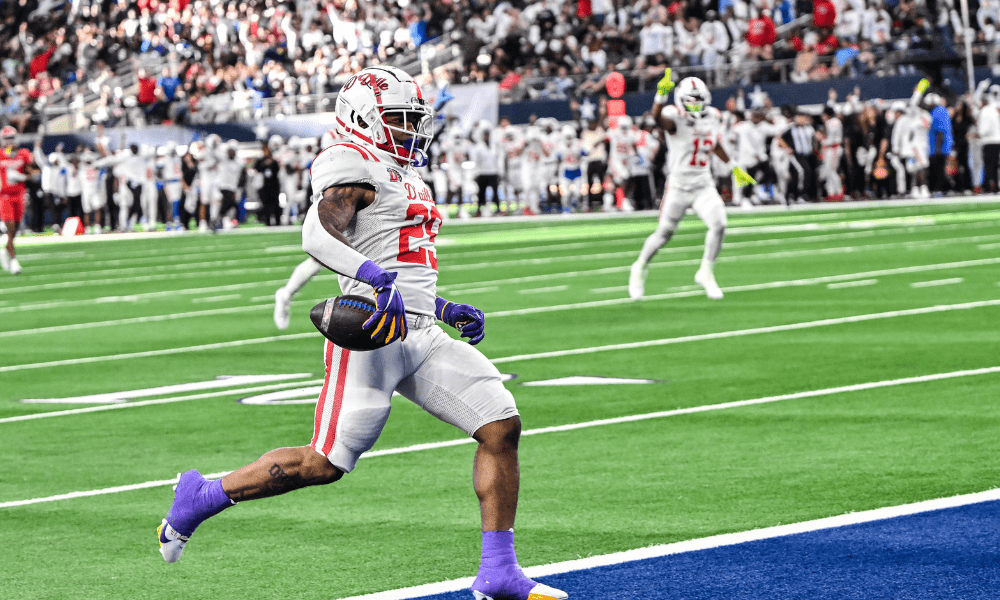High School
Key Tips to Stay Healthy and Perform at Your Best

In Episode 66 of the Texas High School Football Podcast, Dr. Rod Jay Turner Jr. provides invaluable insights into various aspects of athlete health. Dr. Turner delves into topics like hydration, nutrition, mental well-being, and post-game recovery techniques, offering practical advice for young athletes, parents, and coaches alike.
This blog post summarizes and expands on the key points from Dr. Turner’s discussion, emphasizing scientifically-backed strategies to enhance performance and prevent injuries. Whether it’s understanding the importance of proper hydration, pursuing balanced nutrition, acknowledging mental health, or using effective recovery techniques, these insights can make a significant difference in an athlete’s journey.
Importance of Hydration
Staying hydrated is crucial for athlete health, performance, and recovery. Dr. Turner stressed the need to start hydration well before a game or practice. Drinking water at least an hour before physical activity and continuing to hydrate throughout the day is essential. According to the American Council on Exercise, dehydration can reduce an athlete’s endurance, strength, and overall performance by up to 30%. This highlights the importance of maintaining optimal hydration levels.
The body loses water through sweat during intense physical activities. Therefore, it is essential to replenish these fluids to prevent fatigue and other dehydration-related issues. Consistent hydration helps regulate body temperature, lubricates joints, and transports nutrients. Athletes should drink small amounts of water frequently, rather than consuming large quantities occasionally, to maintain hydration throughout the day.
The Science Behind Hydration
Hydration involves more than just drinking water; it also requires maintaining a balance of electrolytes. Water alone can’t replace electrolytes lost through sweat, like sodium and potassium. Sports drinks like Gatorade or electrolyte packets like Drip Drop help replace these electrolytes, ensuring the body maintains its proper function. The Journal of Athletic Training suggests that proper hydration can enhance an athlete’s performance by up to 10%.
Electrolytes play a crucial role in muscle function and energy levels, vital for athletic performance. Imbalances can lead to muscle cramps, dizziness, and even more severe conditions like heatstroke. Athletes can avoid these pitfalls and maintain peak performance by integrating electrolyte-rich beverages into their hydration routine. Awareness and preparation regarding hydration can make a noticeable difference in an athlete’s overall performance and recovery.
Pickles and Salt Tablets: Unconventional But Effective Solutions
Pickles are an excellent source of electrolytes. Dr. Turner highlighted how pickles can quickly rehydrate and prevent muscle cramps. Research published in Medicine & Science in Sports & Exercise found that pickle juice can relieve muscle cramps in just 85 seconds, faster than water or sports drinks. Athletes can carry pickle juice during games and practices to quickly relieve cramps.
Salt tablets, commonly used by long-distance runners, also effectively replace lost sodium and prevent muscle cramps. A study in the Journal of Sports Science found that athletes who used salt tablets significantly improved their endurance performance in hot conditions. These unconventional methods are practical solutions for maintaining electrolyte balance and improving athletic performance, proving that sometimes, the simplest remedies are the most effective.
Nutrition and Recovery
Proper nutrition is crucial for an athlete’s performance and recovery. Dr. Turner emphasized consuming about 1 gram of protein per pound of body weight to ensure muscle repair and growth, vital for high-intensity sports like football. Protein consumption aids in repairing muscle fibers damaged during intense physical activity.
Carbohydrates are equally important as they replenish glycogen stores, providing the energy required for sustained performance. A study from the Journal of the International Society of Sports Nutrition found that athletes who consume balanced meals rich in proteins, carbs, and fats recover faster and perform better in subsequent activities. Including various vegetables ensures that athletes receive essential vitamins and minerals, contributing to overall health and improved athletic performance.
Role of Carbohydrates and Balanced Meals
Carbohydrates are the body’s primary energy source. Consuming carbs before and after games or practices replenishes glycogen stores, providing necessary energy. A balanced post-game meal should include:
- Proteins: Fish, chicken, beef, or vegetarian alternatives.
- Carbohydrates: Rice, potatoes, whole grains.
- Vegetables: A variety of colored veggies for vitamins and minerals.
Athletes should aim for a balanced plate with half vegetables, a quarter of carbohydrates, and a quarter of protein. This ensures a well-rounded intake of essential nutrients for recovery and health.
Effective Recovery Techniques
Proper recovery techniques are essential for maintaining peak athletic performance and preventing injuries. Two critical methods are dynamic warm-ups, static stretching, and cold therapy, including ice baths.
Dynamic Warm-ups and Static Stretching
Dynamic warm-ups prepare the body for physical activity by increasing heart rate and blood flow. Examples include high knees, leg swings, and arm circles. These movements improve flexibility, strength, and coordination while reducing injury risk. A study from the Journal of Strength and Conditioning Research found that dynamic warm-ups enhance athletic performance by up to 5%. Such warm-ups are essential before every game or practice.
Static stretching should be done post-activity. It helps elongate muscle fibers, reduce tension, and improve flexibility. A 5-10 minute post-activity static stretching routine significantly aids recovery and prevents injuries. According to a study published in the Journal of Sports Science & Medicine, athletes who engage in static stretching post-activity experience a 22% reduction in muscle stiffness. This combination of dynamic warm-ups and static stretching ensures athletes are physically prepared and recover effectively, maintaining overall muscle health and flexibility.
Cold Therapy and Ice Baths
Cold therapy, including ice baths and plunges, reduces muscle soreness and inflammation. These methods constrict blood vessels and reduce metabolic activity, slowing down processes that lead to muscle damage and soreness. Research from the Journal of Sports Science & Medicine found that athletes using cold therapy reported reduced muscle soreness and quicker recovery times than those who did not. Many professional athletes use this technique to maintain peak performance levels.
Cold therapy may be uncomfortable, but its effectiveness in reducing acute inflammation makes it valuable for recovery. A study in the International Journal of Athletic Therapy & Training reported that regular cold therapy can reduce muscle soreness by up to 50%. For high school athletes, even simple methods like icing joints can have significant benefits. Incorporating cold therapy into a regular recovery routine helps athletes prepare for subsequent games and practices, ensuring they remain at their physical best.
Mental Health: The Overlooked Aspect of Athletic Performance
Mental health significantly impacts athletic performance. Dr. Turner highlighted stressors like performance pressure, scholarship aspirations, and balancing academics and social life. These pressures can lead to anxiety, depression, and burnout, which can be as debilitating as physical injuries. Ignoring mental health issues can result in reduced performance, strained relationships, and even long-term mental health problems. Therefore, it’s essential to address mental health proactively and thoughtfully, giving it the same importance as physical well-being.
Moreover, the stigma surrounding mental health often prevents athletes from seeking help. This reluctance can exacerbate issues, leading to severe consequences on and off the field. Athletes, coaches, and parents need to recognize the importance of mental health and integrate support systems into athletic programs. A comprehensive approach that includes mental health can assist athletes in achieving a balanced, successful, and fulfilling athletic career.
Prevalence of Mental Health Issues in Athletes
A study by the American College of Sports Medicine found that around 30% of female athletes and 25% of male athletes report symptoms of anxiety or depression. This statistic underscores the importance of mental health support within sports programs. The pressures of high-level competition, coupled with academic and social demands, can heavily burden young athletes. Failure to address these issues can lead to detrimental effects on their performance and overall well-being.
The National Collegiate Athletic Association (NCAA) also reported that one in four college athletes felt overwhelmed and experienced difficulty functioning due to mental health concerns. These figures highlight the need for comprehensive mental health programs within athletic organizations. Recognizing and addressing mental health issues can improve an athlete’s quality of life and enhance their ability to perform at their best.
Proactive Measures for Mental Well-Being
Encouraging open conversations about mental health and providing access to counselors are crucial steps in safeguarding athlete well-being. Coaches and teammates should foster an environment where discussing mental health is normalized and stigma-free. Implementing regular mental health check-ins and workshops can help athletes feel supported and understood. Early identification of mental health issues allows for timely intervention and effective management.
Recognizing signs of mental stress, such as changes in mood or behavior, is critical to early intervention and support. Parents and coaches should be trained to identify these signs and take appropriate action. Statistics from the American Psychological Association reveal that athletes who receive mental health support have a 30% higher satisfaction rate in their athletic performance. Integrating mental health care into athletic programs can create a more holistic approach to athlete development, ensuring both physical and mental well-being.
Comprehensive Post-Game Recovery Routine
A thorough post-game recovery routine significantly impacts an athlete’s next-game performance. Recovery is not just about resting; it involves a series of strategic actions to restore the body to its optimal state. Proper recovery practices can reduce muscle soreness, minimize injury risk, and ensure athletes feel refreshed and ready for the next activity.
Essential Components of Recovery
The essential components of a post-game recovery routine include hydration, nutrition, stretching, cold therapy, and rest. By focusing on these critical areas, athletes can ensure their bodies recover efficiently, reducing the risk of injury and improving performance in subsequent games or practices.
Hydration:
Continue drinking water and sports drinks to replace lost fluids and electrolytes. According to the National Athletic Trainers’ Association, athletes can lose up to 2-6% of their body weight through sweat during intense exercise. Hence, rehydrating is crucial to avoid cramps and maintain muscle function. Aim to drink fluids with electrolytes like sodium and potassium to replenish what was lost during the game.
Nutrition:
Consume a balanced meal rich in proteins, carbohydrates, and vegetables. Proteins help with muscle repair and growth, while carbohydrates replenish glycogen stores, providing the energy needed for recovery. A study in the Journal of the International Society of Sports Nutrition found that athletes who consumed a post-exercise meal with a 3:1 ratio of carbs to proteins recovered faster and experienced less muscle soreness.
Stretching:
Engage in static stretching to relax and elongate muscles. Post-activity stretching helps reduce muscle stiffness and ensures muscle fibers return to their average length. According to the American Council on Exercise, athletes who incorporate regular stretching routines into their recovery plans experience a 23% improvement in flexibility and a notable reduction in injury risk.
Combining Cold Therapy and Adequate Rest:
Combining cold therapy with adequate rest maximizes recovery efficiency and enhances overall athlete well-being. These practices address immediate muscle repair needs and long-term physical health, ensuring athletes are prepared for future challenges.
Cold Therapy:
Use ice baths or cold plunges to reduce inflammation and soreness. Cold therapy constricts blood vessels and decreases metabolic activity, which helps slow down the processes leading to muscle damage. Research from the Journal of Sports Science & Medicine found that athletes using cold therapy reported a 50% reduction in muscle soreness and quicker recovery times than those who did not. If ice baths aren’t unavailable, ice packs on crucial muscle groups can be an effective alternative.
Rest:
Ensure adequate sleep for full-body recovery. Sleep rejuvenates the body, repairs muscles, and consolidates memory, including muscle memory. The National Sleep Foundation recommends that young athletes get between 8 and 10 hours of sleep per night for optimal recovery. Lack of sleep can affect cognitive function, reaction time, and physical health, making it essential to prioritize rest.
While professional teams often have advanced recovery facilities, high school athletes can still benefit from these principles using more accessible methods. For instance, bringing a protein shake to drink post-game helps meet nutritional needs immediately. Simple tools like foam rollers, stretching bands, and ice packs can also compensate for lacking specialized equipment. Following a structured post-game recovery routine, high school athletes can improve their performance and overall well-being, ensuring they stay competitive and healthy.
Final Thoughts on Athlete Health and Recovery
The Texas High School Football Podcast with Dr. Rod Jay Turner Jr. offers valuable insights into maintaining athlete health. It emphasizes hydration, nutrition, mental well-being, and recovery. These factors are crucial in shaping a balanced and effective training regimen for young athletes, helping them perform at their best and preventing injuries.
Implementing the strategies discussed—proper hydration, balanced nutrition, mental health awareness, and effective recovery techniques—can significantly impact an athlete’s journey. By prioritizing these aspects, athletes, parents, and coaches can foster a supportive environment that encourages physical and mental wellness, ensuring long-term success and satisfaction in sports. For a deeper understanding, tune into Episode 66 of the podcast and arm yourself with knowledge to build a healthier sports experience.



















